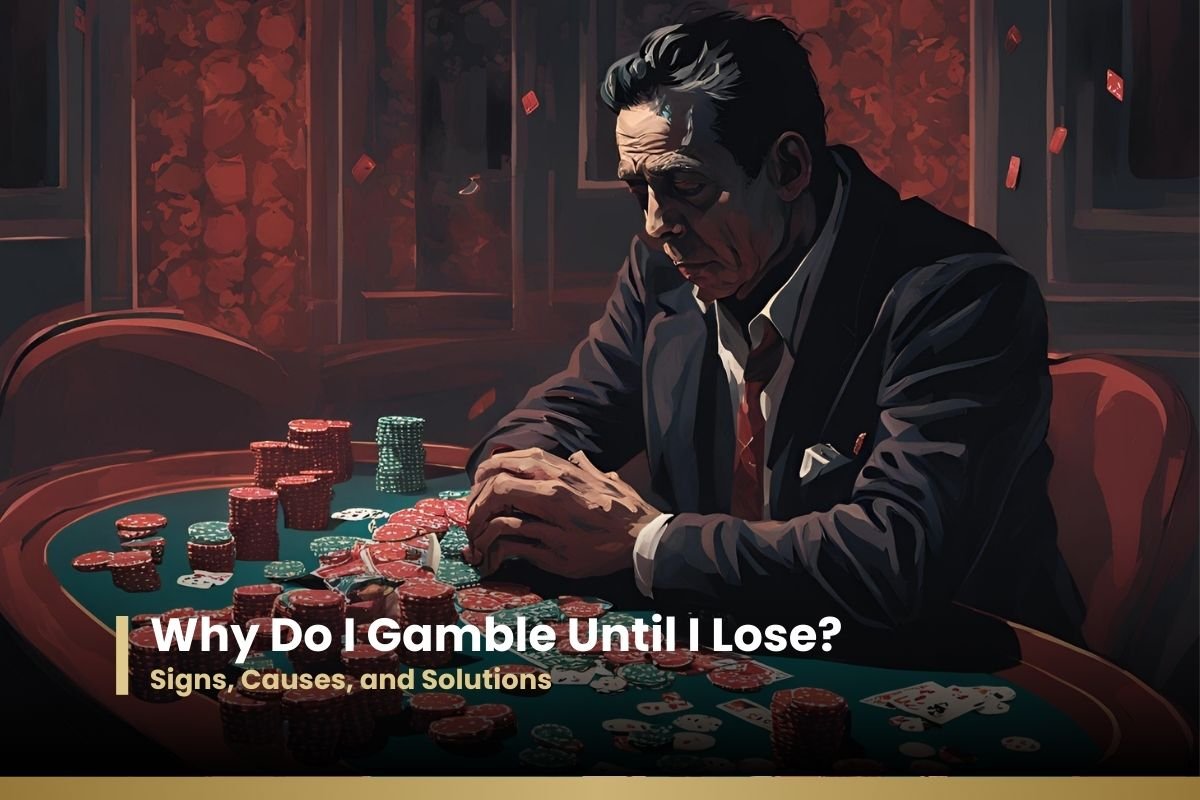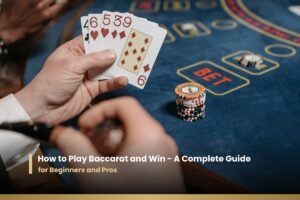So why do I gamble until I lose? The question highlights the complexity of gambling addiction, where the thrill of winning can quickly spin out of control. For many, psychological factors like the brain’s dopamine reward system, emotional coping mechanisms, and cognitive biases drive this behaviour. For others, gambling goes from being entertainment to compulsion and then financial, social and emotional struggles.
Understanding the underlying reasons for this compulsion is the first step to breaking free from the cycle. This guide will look at the psychological triggers, phases of gambling addiction and the long-term consequences and give you insight into how to recognize and address the problem.
The Psychology of Gambling Until Loss

Gambling releases dopamine, the feel-good neurotransmitter, in the brain. This is so powerful that even losing releases dopamine, especially with near-misses that feel like a win. According to Nature Neuroscience, near-misses activate the same brain circuits as actual wins and the compulsion to keep playing. In some cases, gambler’s dopamine levels increase by 10 times the normal amount, and they can’t stop playing.
1. The Gambler’s Fallacy and Cognitive Bias
The Gambler’s Fallacy is the mistaken belief that past outcomes affect future ones. For example, a person betting on red after a series of black at a roulette table believes red is “due” even though each spin is independent. 70% of habitual gamblers have this cognitive bias, as found in a University of Cambridge study, and that’s why they chase losses irrationally.
Cognitive biases like the Gambler’s Fallacy significantly contribute to pathological gambling, where individuals have a compulsive urge to gamble despite negative consequences.
2. Escapism and Emotional Coping
Many gamble to escape negative emotions like stress, anxiety or depression. The National Council on Problem Gambling (NCPG) reports 60% of problem gamblers use gambling as a coping mechanism, which leads to a cycle of temporary relief followed by guilt and greater stress from financial loss. People who gamble to escape are 5 times more likely to develop gambling disorders. And individuals with gambling addiction are 2 times more likely to experience anxiety and depression, as found in the Addiction Journal.
Facts
- Chasing Losses: Approximately 75% of problem gamblers continue betting more to recover their losses, despite mounting debts.
- Global Impact: The World Health Organization (WHO) estimates that 2.3% of the global population suffers from gambling disorder, often facing serious financial and psychological consequences.
- Brain Activity: Brain imaging studies show problem gamblers have the same brain activity as substance abusers; how serious is gambling addiction?
Knowing these psychological factors will help you recognize and stop the cycle of gambling until loss. Awareness and intervention can break the cycle and lead to recovery.
The Four Phases of Gambling Addiction – Reason Why do I gamble until I lose

Problem gambling develops in four stages, each with specific behaviors and consequences. Knowing these stages can help you understand the journey from occasional gambling to full-blown addiction. Individuals may gamble compulsively through these different phases, experiencing increasing difficulty in controlling their gambling behavior.
1. Winning Phase
- Initial Euphoria: This stage starts with the excitement of winning early and the potential to win money, which releases a lot of dopamine and reinforces the urge to gamble. Winning gives you a false sense of control and success.
- Increased Bets: As you win, you often bet more frequently and at higher stakes. According to research in Behavioral Addictions, 70% of gamblers increase their bets within the first six months, thinking bigger bets mean bigger rewards.
- Illusion of Control: Gamblers think they can control the outcome and keep taking more risks.
2. Losing Phase
Chasing Losses: When you lose more often, you start chasing losses, making riskier bets to recover. This often leads gamblers to lose money, exacerbating their financial situation. Around 75% of problem gamblers do this, which makes their financial situation worse.
Debt Accumulation: To fund gambling, you borrow money, sell assets or use credit. The Journal of Gambling Studies says 60% of problem gamblers have borrowed or stolen to keep gambling.
Emerging Stress: Debt causes stress, anxiety and strained relationships, and you start lying to cover up your gambling.
3. Desperation Phase
Risky and Desperate Actions: As losses mount, the desperation phase kicks in. Gamblers become reckless, sometimes doing illegal things to get money. They may deplete their bank account in desperate attempts to fund their gambling. Severe anxiety and depression are common, 50% of problem gamblers report significant depressive symptoms.
Social Isolation: You withdraw from loved ones and feel guilty and ashamed. The addiction takes over your life, affecting work, relationships and daily living.
4. Hopelessness Phase
Severe Despair and Helplessness: The final phase is hopelessness, with the financial and emotional damage feeling too big to overcome. The National Council on Problem Gambling says 20% of those in this phase consider self-harm or suicide. Gambling can distort an individual’s perception of money, causing significant sums to feel normal and diminishing the value of money in everyday life, which further impacts their daily responsibilities and emotional well-being.
Total Loss of Control: Gamblers are in debt, relationships are broken, and mental health is in crisis. The World Health Organization (WHO) says problem gamblers are six times more likely to have suicidal thoughts than the general population.
Key Statistics
- Average Debt: Problem gamblers have an average debt of $30,000 to $50,000, according to the North American Foundation for Gambling Addiction Help.
- Relationship Damage: 40% of gambling addicts have major relationship breakdowns, including divorce or family estrangement.
- Mental Health Crisis: The emotional toll is highlighted by studies showing a strong link between gambling addiction and suicidal ideation.
Understanding these phases emphasizes the importance of early intervention to prevent the cycle from escalating. Seeking help early can mitigate the devastating consequences of problem gambling.
Statistics on Gambling and Loss
Gambling addiction has significant financial, emotional, and social consequences. Key statistics shed light on its devastating impact:
According to the American Gaming Association, gambling losses in the United States amounted to billions of dollars annually.
1. Financial
- Debt Accumulation: People with severe gambling problems have $30,000-$50,000 in debt, some up to hundreds of thousands. (National Center for Responsible Gaming)
- Economic Burden: Gambling addiction costs the US economy billions a year in lost productivity and debt.
2. Gambling Addiction Rates
- Prevalence: 2-3% of adults will have a gambling disorder in their lifetime. (National Council on Problem Gambling)
- High-Risk Groups: Adolescents and young adults are twice as likely to become addicted. (The Journal of Adolescent Health) The rise of sports betting has significantly impacted gambling addiction rates among young adults, increasing the risks and associated mental health issues.
3. Mental Health and Social Impact
- Social Isolation: 60% of problem gamblers have significant relationship breakdowns, often exacerbated by a gambling problem. (Journal of Gambling Studies)
- Mental Health: Problem gamblers are twice as likely to experience severe anxiety or depression, 20% contemplate suicide. (American Psychological Association)
- Family and Work: Gambling addiction leads to divorce, estrangement and job loss due to absenteeism and reduced productivity.
4. Chasing Losses
Behavioral Patterns: 75% of problem gamblers “chase losses”, bet more to get back what they lost. This only makes things worse for them financially and emotionally. (National Council on Problem Gambling) Slot machine play often exacerbates this behavior, as players continue to feed money into the machine hoping for a big win to recover their losses.
Cognitive Bias: Chasing losses is due to the gambler’s fallacy—believing a win is due after a streak of losses.
Gambling addiction affects millions worldwide, financial loss, relationship strain and mental health problems. Recognition and early intervention are vital to breaking the cycle and minimising the damage.
Impact of Losses on Mental Health
Compulsive gambling has severe mental health consequences, compounding financial and social struggles.
1. Anxiety and Depression
- 50% of problem gamblers experience severe anxiety or depression due to financial strain, guilt and emotional distress.
- Shame and isolation make it harder for people to seek help.
2. Substance Abuse
- 20-30% of gamblers develop substance abuse as a way to cope with stress and despair.
- Substance abuse makes decision-making worse, and gambling and financial problems worse.
3. Suicidal Thoughts
- Problem gamblers are 6 times more likely to think about or attempt suicide than the general population.
- Gambling-related suicides are often due to debt and hopelessness, so mental health interventions are crucial.
4. Relationship Problems and Isolation
- Strained relationships with family and friends lead to social isolation, which makes feelings of loneliness and despair worse.
- A Journal of Gambling Studies report shows 60% of problem gamblers experience significant relationship breakdowns.
5. Emotional Dysregulation
- Emotional dysregulation
- Conflict at home and work.
The mental toll of gambling addiction underscores the need for timely support and intervention.
Social and Financial Consequences of Gambling to Loss
Gambling addiction has big social and financial implications that can mess up your personal and professional life. Financial ruin is one of the most common outcomes, with people racking up huge debt by borrowing from friends, family or loan sharks. The shift from traditional gambling environments like Las Vegas to online casinos platforms has expanded access and increased the potential for gambling-related issues.
Debt spirals out of control and can lead to bankruptcies and financial collapse. Relationship breakdowns are another big consequence, as the secrecy and financial pressure of gambling leads to mistrust, arguments and estrangement.
60% of problem gamblers experience serious relationship problems, including divorce. And employment consequences are expected, with gamblers struggling due to absenteeism, reduced productivity and job loss due to stress and distraction.
Signs of Compulsive Gambling and When to Get Help
Knowing the signs of gambling disorders is the first step to recovery.
Signs of Problem Gambling
- Betting more to get the buzz, similar to the thrill a compulsive gambler experiences, driven by the hope of impending success with just one more bet.
- Feeling restless or irritable when trying to cut down or stop gambling.
- Using gambling as a way to cope with negative emotions.
- Hiding gambling from others.
Getting Help for Gambling Addiction
If you or someone you know is struggling with a gambling problem, it’s crucial to seek help. Therapy, support groups, and helplines are available to provide the necessary support. Cognitive Behavioral Therapy (CBT) and organizations like Gamblers Anonymous can be particularly effective in addressing the underlying issues and behaviors associated with gambling addiction. Early intervention and education about the dangers of gambling can also play a significant role in prevention.
Preventive Measures and Healthy Alternatives to Online Casino Gambling
Taking proactive steps can reduce the risk of gambling addiction and promote healthier behaviours.
1. Setting Limits: Set strict time and money limits on gambling, and adhere to them without exceptions.
2. Exploring Other Outlets for Reward: Replace gambling with activities that provide natural dopamine boosts, such as exercise, hobbies, or social interactions. The pursuit of winning money can be replaced with healthier activities that offer similar psychological rewards without the financial risks.
3. Education and Awareness: Learning about risk factors and triggers for gambling addiction empowers individuals to make informed decisions. Awareness campaigns can help individuals recognize early signs and seek help before addiction takes hold.
FAQs
Q. How do I know I have a problem?
Signs of addiction, such as compulsive gambling, include increasing the bet to get the buzz, feeling restless or irritable when you cut back, gambling to escape negative emotions, lying to hide your habit, and experiencing financial or relationship problems because of gambling. If you tick any of these boxes, seek help.
Q. What are the financial risks of addiction?
Addiction can lead to massive debt, problem gamblers owe on average $30,000-$50,000. Some borrow from friends, family, or loan companies, viewing their funds as mere numbers in a bank account, and end up in more financial mess. Bankruptcy and loss of assets are common outcomes.
Q. How does addiction affect mental health?
Gambling addiction and gambling disorders are linked to anxiety, depression, and stress. 50% of problem gamblers report severe anxiety or depression and 20-30% develop co-occurring substance abuse issues. Problem gamblers are 6 times more likely to attempt or consider suicide than the general population.
Q. How do I overcome addiction?
Recovery starts with acknowledging the problem and seeking help. Effective ways include Cognitive Behavioral Therapy (CBT), joining support groups like Gamblers Anonymous and contacting gambling helplines. Setting strict limits on time and money spent gambling and finding healthier outlets like exercise or hobbies can also help.
Conclusion:
Why do I gamble until I lose? It’s down to psychological, emotional and social factors like the brain’s dopamine reward system and cognitive biases like the gambler’s fallacy. Pathological gambling progresses through stages and ends in financial ruin, strained relationships and mental health problems. Recognise the signs like chasing losses and emotional distress and intervene early.
If you’re a problem gambler, seek help through therapy, support groups and prevention like setting limits and finding healthier hobbies. Recovery is possible with the right support and you can get back in control and move towards a healthier life.
Note: Ballersbet is a betting platform for users 18+. Betting carries financial risk, so please gamble responsibly and make informed choices.

I’m a Michele, Casino Analyst and Reviewer at Ballersbet.com, where I specialize in providing honest insights and expert reviews of the latest casino games and platforms. With a passion for online gaming and a commitment to transparency, I strive to help players make informed decisions in the ever-evolving world of online casinos.






